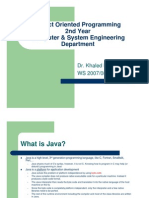Object oriented programming
Uploaded by
sriramshreyasreddyObject oriented programming
Uploaded by
sriramshreyasreddyObject oriented programming: (concept of object)
Object oriented programming is a paradigm provides many concepts such as inheritance, data
binding, polymorphism.
1) Inheritance:
Inheritance is a mechanism where a new class inherits properties and behaviour from an
existing class.
2) Polymorphism: allows object of different classes to be treated as object of a common super
class.
3) Abstraction: Removal of unnecessary data and information from the program.
Concepts in OOPS:
1) Object: Entity that has state and behaviour is called a subject.
2) Class: Collection of objects
3) Inheritance: When an object acquires all the previous aspects of the parent object
4) Polymorphism:
5) Abstraction
6) Encapsulation
Features of Java:
1)object oriented
2) simple
3) portable
4) platform independent
5) secured
6) robust
7) Architectural neutral
8) Dynamic
9) Interpreted
10) Hight performance
11) Multiheaded
12) Distrib
Variables: something that always varies case to case.
Data types: Integer
, float values : decimals;1.23
Characters : single letter eg: ‘a’, ‘&’
String: more than one letter
Boolean: Yes/ No or true or false
Operators are the symbols used for performing specific operations.
There 9 types of operators in java
1) Arithmetic operators: mathematical operations like (+,-,x,/)
2) Unary operators:
3) Assignment operator
4) Relational operators
5) Logical operators
6) Ternary operators
7) Bit-wise operators
8) Shift operators
Java Comments: used to describe the code more briefly to another person. Comments will
net be executed by the compiler and the interpreter.
Single line comment: only compatible to 1 line (starts with //)
Multiline comment: used for more than one line ( starts with /* and ends with */).
Java Variable Example: Add 2 numbers
class Simple{
public static void main(String[] args){
int a=10;
int b=10;
int c=a+b;
System.out.println c;
}
Types of Vareiables in java:
There are three types of variables in java:
1) Local variable:
2) Instance Variable
3) Static variable
Java Enum: contains a fixed number of constants
Eamples:
class EnumExample1{
public enum Season {WINTER,SPRING,SUMMER,FALL)
public static void main(String[] args){
for (Season s : Season.values)
Control Statements
Array: array is used to store a fixed sequential collection of elements of the same type.
Array index numbers will begin from 0-9.\
Java Console example:
Import java.io.Console;
Class ReadStringTest{
Public static void main
You might also like
- Introduction To Object Oriented Programming Concepts: Computer ApplicationsNo ratings yetIntroduction To Object Oriented Programming Concepts: Computer Applications9 pages
- SBLJava Lab Manual 24-25 Journal TheoryNo ratings yetSBLJava Lab Manual 24-25 Journal Theory24 pages
- Object Oriented Programming 2nd Year Computer & System Engineering DepartmentNo ratings yetObject Oriented Programming 2nd Year Computer & System Engineering Department52 pages
- imp terms & definitions 10th to email. (1)No ratings yetimp terms & definitions 10th to email. (1)13 pages
- Questions Unit 1 Basic Syntactic Constructs in JavaNo ratings yetQuestions Unit 1 Basic Syntactic Constructs in Java8 pages
- (502) Java Programming and Dynamic Web page Design NotesNo ratings yet(502) Java Programming and Dynamic Web page Design Notes46 pages
- 182196-1739335271-Grade_VIII-_Study_Material-_Java_2No ratings yet182196-1739335271-Grade_VIII-_Study_Material-_Java_216 pages
- 1: Control Structures: Lab 02 Control Structures and Java Class Libraries ObjectivesNo ratings yet1: Control Structures: Lab 02 Control Structures and Java Class Libraries Objectives10 pages
- What Is Pass by Value, Pass by Reference?: HashtableNo ratings yetWhat Is Pass by Value, Pass by Reference?: Hashtable8 pages
- BE EXPERT IN JAVA Part- 2: Learn Java programming and become expertFrom EverandBE EXPERT IN JAVA Part- 2: Learn Java programming and become expertNo ratings yet
- Data Handling and Visualization Midterm Assessment (20pts)No ratings yetData Handling and Visualization Midterm Assessment (20pts)4 pages
- MPR Quick Start Guide For Powering and Installation 3db20024caaatnzza Ics01No ratings yetMPR Quick Start Guide For Powering and Installation 3db20024caaatnzza Ics012 pages
- SG - Module 01 & 02 - BASIC CONCEPTS OF FUNCTION AND EVALUATING OF FUNCTIONNo ratings yetSG - Module 01 & 02 - BASIC CONCEPTS OF FUNCTION AND EVALUATING OF FUNCTION12 pages
- B.Tech SEM 1 (BAIT, BMCET, MSCET) PRACTICAL WINTER 2023No ratings yetB.Tech SEM 1 (BAIT, BMCET, MSCET) PRACTICAL WINTER 20231 page
- Survey of Battery Energy Storage Systems and Modeling Techniques PDF100% (1)Survey of Battery Energy Storage Systems and Modeling Techniques PDF8 pages
- C++ Classes, Member Functions (Getters-Setters, Accessors-Mutators)No ratings yetC++ Classes, Member Functions (Getters-Setters, Accessors-Mutators)24 pages
- Journal of Statistical Software: Pyssm: A Python Module For Bayesian Inference of Linear Gaussian State Space ModelsNo ratings yetJournal of Statistical Software: Pyssm: A Python Module For Bayesian Inference of Linear Gaussian State Space Models37 pages
- Optimization of Knuckle Joint by Using Finite Element Analysis and Its Experimental ValidationNo ratings yetOptimization of Knuckle Joint by Using Finite Element Analysis and Its Experimental Validation7 pages
- 18.2 - 27.2 Sybsc CS SPPU DS Practical Slip SolutionsNo ratings yet18.2 - 27.2 Sybsc CS SPPU DS Practical Slip Solutions9 pages

























































































